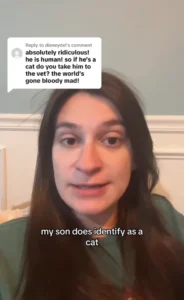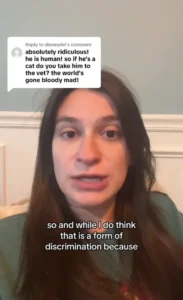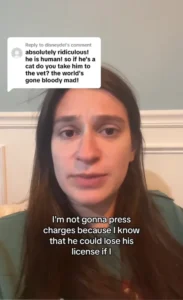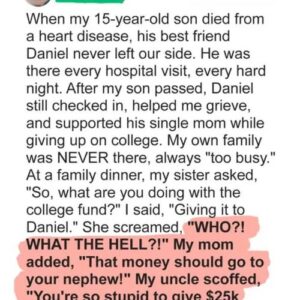Note: we are republishing this story which originally made the news in August 2023.
In a truly bizarre turn of events, a viral video is making the rounds on the internet, featuring an American woman insisting that her son identifies as a cat. The video, initially shared by a British figure warning of societal collapse, has sparked widespread debate and concern, particularly among conservatives who view it as a symptom of a society in decline.
 Photo Credit: isatandstared/Tiktok
Photo Credit: isatandstared/Tiktok
The woman in the video expresses frustration over the veterinarian’s refusal to treat her son, citing his identification as a cat. She contends that her son’s self-professed feline identity should warrant veterinary care tailored to the needs of a cat. This perceived denial of service based on species, she argues, amounts to a troubling form of discrimination.
Despite her grievances, she claims she won’t pursue legal action against the veterinarian. However, she staunchly advocates for the rights of individuals identifying as animals, asserting that they should be allowed access to veterinary care without prejudice.
 Photo Credit: isatandstared/Tiktok
Photo Credit: isatandstared/Tiktok
Upon closer inspection, it was revealed that the video originated from a satirical account, serving as a parody and existing far from the realms of reality. Nevertheless, some viewers failed to discern the humor and satire, interpreting the video seriously and expressing genuine concerns about the state of the world.
Conservatives have seized upon this viral incident as emblematic of a larger cultural shift, where societal norms and values appear to be unraveling. The unintentional consequences of the video, they argue, reflect a broader challenge in maintaining order and traditional values in an era of rapidly changing social dynamics.
 Photo Credit: isatandstared/Tiktok
Photo Credit: isatandstared/Tiktok
This peculiar incident also underscores the broader dilemma of distinguishing between satire and reality in the age of widespread internet dissemination. The blurred lines between genuine news and satirical content raise questions about media literacy and the responsibility of content creators and consumers alike.
As the video continues to circulate, it serves as a cautionary tale about the power of online content to shape narratives and perceptions. The incident prompts a critical examination of the impact of digital communication on societal norms, highlighting the need for a discerning public capable of navigating the complexities of satire in an information landscape where reality and parody often converge.
 Photo Credit: isatandstared/Tiktok
Photo Credit: isatandstared/Tiktok
While the video’s satirical nature may be lost on some, the broader conversation it has ignited speaks to deeper concerns about the cultural trajectory and the challenges of maintaining a cohesive society in the face of evolving norms and shifting perspectives.
Sources: M9





